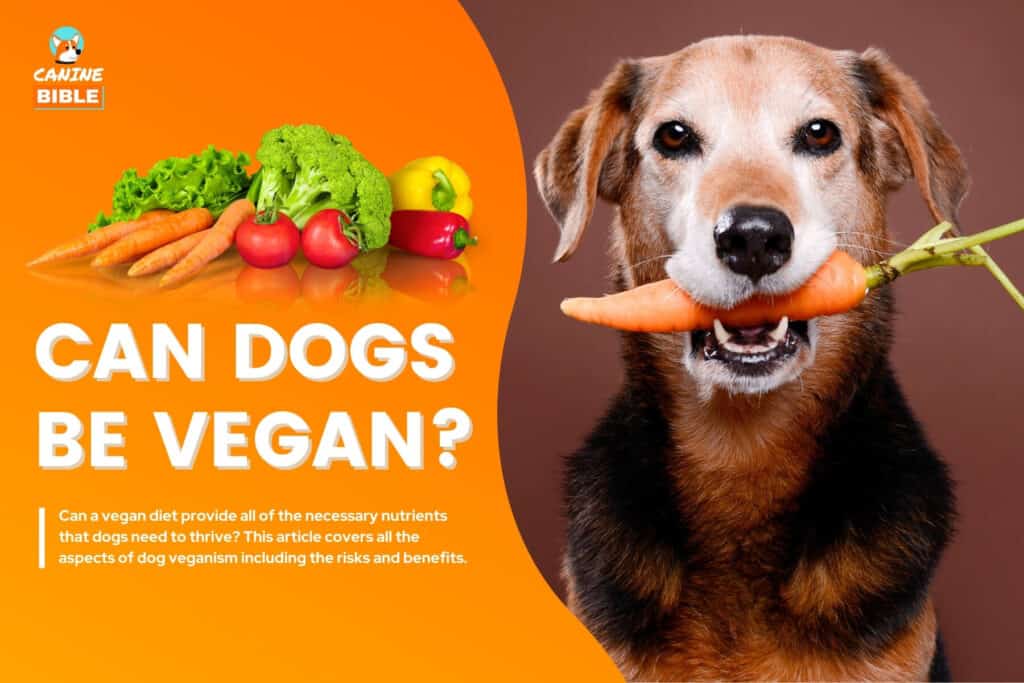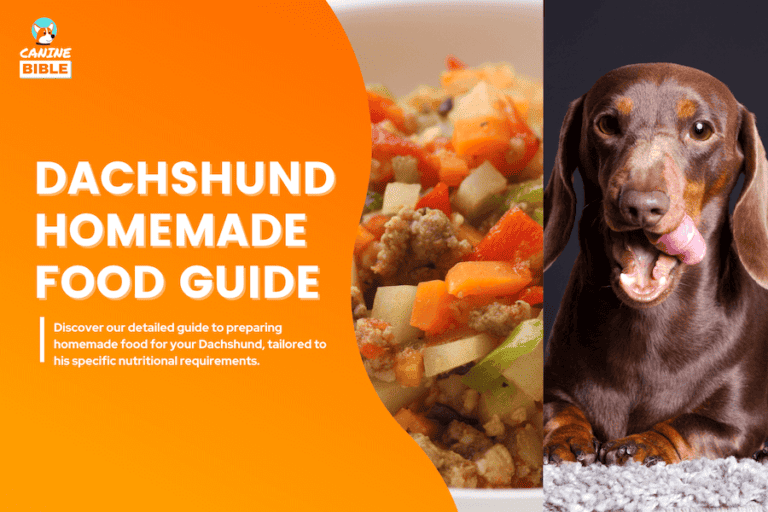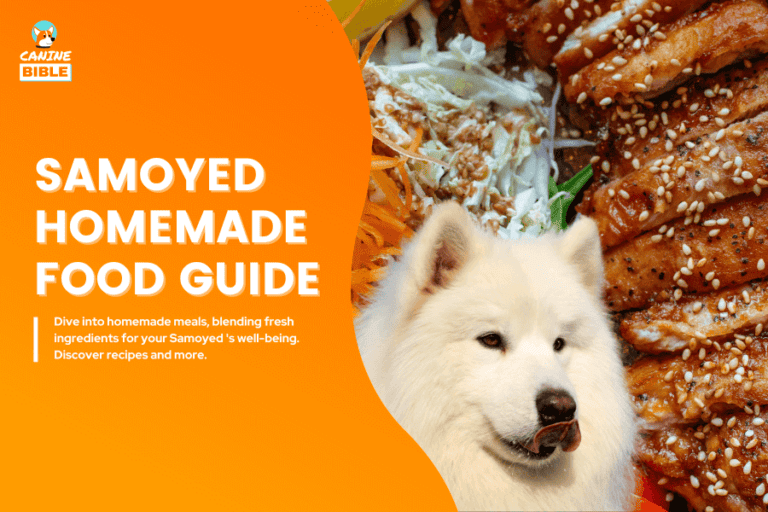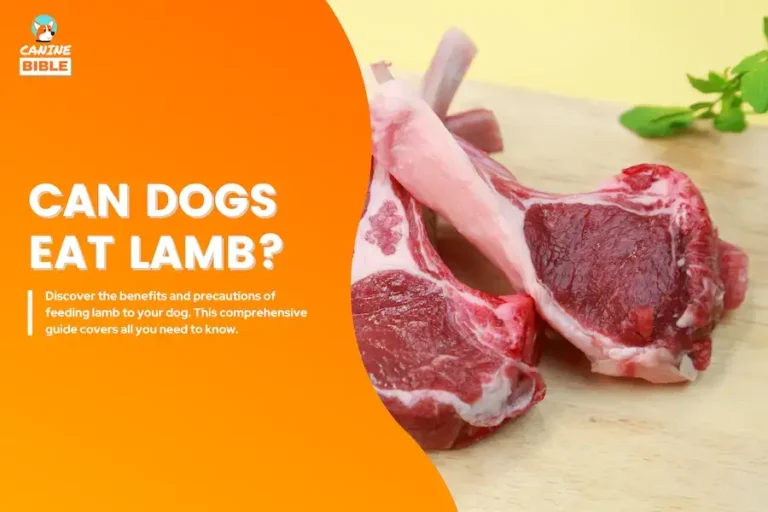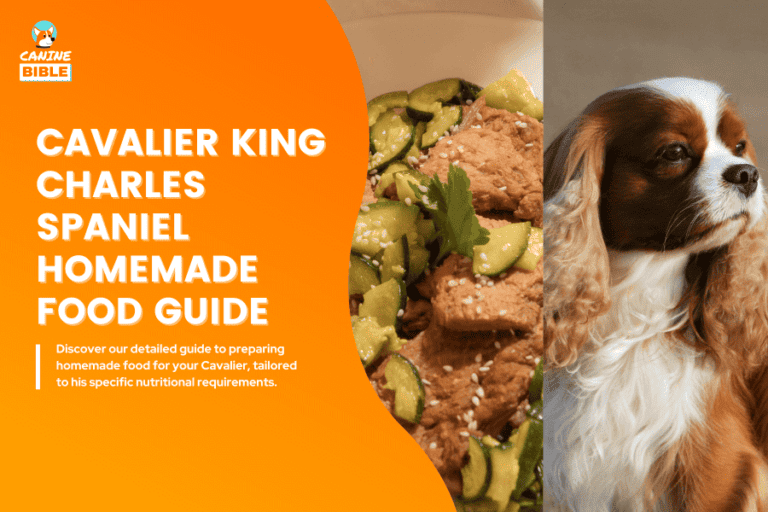Homemade Vegan Dog Food: 10 Vet-Approved Recipes, Ingredients & Diet Plan
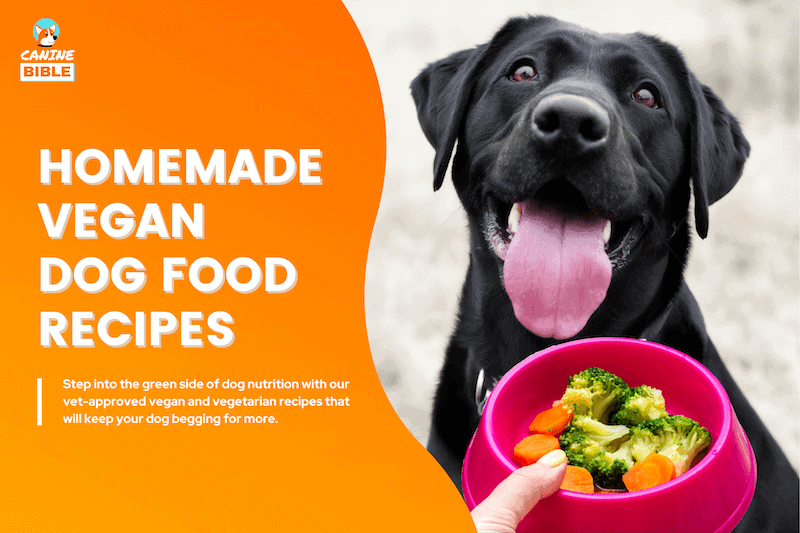
Canine Bible is reader-supported. We receive affiliate commissions via some of our links. This doesn’t affect rankings. Learn more.
This content was reviewed and fact-checked by veterinarian Dr. Aukse Caraite, DVM.
This is the most comprehensive guide to homemade vegan dog food. Going vegan is a personal choice that can also extend to our furry friends. However, cooking veggie-based food for dogs requires careful planning and important guidelines you need to follow. If you want to learn how to make vegan dog food at home, we cover everything from the basics of vegan dog food nutrition to the best homemade vegan dog recipes, ingredients, and everything you need to know about vegan dog meals. Let’s dive right in!
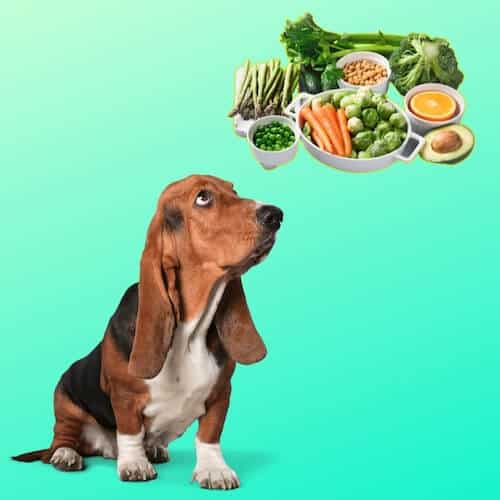
Nutrition, Benefits & Risks
Jump to: Recipes & Cooking
Can Dogs Eat Homemade Vegan Dog Food?
Dogs can eat homemade vegan recipes, but there are important considerations to keep in mind. Dogs are omnivores and can thrive on a well-planned plant-based diet as long as it is balanced and meets its unique nutritional requirements.
Why Feed Homemade Vegan Food to Your Dog
Homemade Vegan Dog Food Risks
Research by the University of California Davis, School of Veterinary and two studies published in The Journal Preventive Veterinary Medicine and The Journal of Nutritional Science found that most homemade dog food recipes lack key essential nutrients, and other recipes used dangerously high levels of some nutrients.[5],[6]
48%
of homemade dog diets had an imprecise determination of ingredients and quantities
28.3%
didn’t use any recommended vitamins, minerals, or amino acids.
30.4%
of the pet parents admitted
to purposely change
the recipe.
40%
of owners didn’t measure the proportions of the ingredients well enough.
Key Considerations When Feeding Your Dog A Vegan Homemade Recipe
You can get personalized nutritional advice from a registered vet nutritionist through Vetster anytime, anywhere. You can also chat with an online vet and ask them questions about your dog’s nutritional needs.
How to Make Vegan Dog Food
Vegan homemade food for dogs must include the six essential nutrients for proper growth, body function, and health. These nutrients include proteins, carbohydrates, minerals, vitamins, fats, and water.
Below is a detailed breakdown of each nutrient and its importance.
Dog Vegan Recipe Nutritional Guidelines
Proteins
Protein plays a vital role in your dog’s diet, providing essential amino acids necessary for bodily processes, including the creation of blood glucose for energy. Protein also helps build and repair muscles and other body tissues. It’s needed to make new skin cells, grow hair, hormones and enzymes. The proteins in your dog’s diet must have a balanced amino acid profile and are provided in appropriate amounts.
Protein dietary recommendations for dog’s vegan homemade food:
Protein sources for homemade vegan food include:
Carbohydrates
Dogs need energy for daily activities like growth, pregnancy, lactation, and exercise. This energy, measured in calories, comes from carbohydrates, proteins, and fats. Dogs, derive some energy from carbohydrates. Carbohydrates supply glucose needed by the brain, nervous system and other critical organs for normal function in dogs.
Energy dietary recommendations based on life stage, weight and activity level.
| Type of Dog | 10 lb | 30 lb | 50 lb | 70 lb | 90 lb |
|---|---|---|---|---|---|
| Puppies | 990 | — | — | — | — |
| Inactive Dog | 296 | 674 | 989 | 1,272 | 1,540 |
| Adult Active Inactive Dog | 404 | 922 | 1,353 | 1,740 | 2,100 |
| Pregnant Dog | 518 | 1,274 | 1,940 | 2,570 | 3,170 |
| Young Active Dog | 436 | 993 | 1,451 | 1,876 | 2,264 |
| Senior Active Dog | 327 | 745 | 1,093 | 1,407 | 1,700 |
Carbohydrate sources for homemade vegan recipes include:
Fats
Fats play a multifaceted role in a dog’s diet. They are a dense energy source, provide essential fatty acids for skin and coat health, enable absorption of fat-soluble vitamins, improve food palatability, offer insulation and organ protection, support reproductive health, are critical for nervous system function, and serve as a reserve for energy storage.
Fat dietary recommendations for vegan homemade dog food:
Fat sources for vegan dog food recipes:
Minerals
Minerals in a dog’s diet are indispensable for bone and dental health, nerve function, enzymatic reactions, fluid balance, oxygen transport, and maintaining the body’s pH level, making them essential for overall health and metabolic processes. Proper mineral balance is crucial and should be carefully managed to avoid deficiencies or excesses.
These 12 minerals are known to be essential nutrients for dogs:
Mineral sources for vegan dog food recipes include:
Vitamins
Vitamins in a dog’s diet are integral for maintaining overall health and bodily functions. They support vision, immune health, aid in energy metabolism and nervous system function, provide antioxidant benefits, reduce inflammation, prevent diseases and ailments and more. Dogs require vitamins, but only in small amounts, and excessive doses of certain vitamins, like vitamin D, can harm them.[9]
These 12 vitamins are known to be essential nutrients for dogs:
Vitamin sources for homemade vegan dog food include:
Vitamins
Water is vital in a dog’s diet for maintaining hydration, supporting body functions such as digestion, nutrient absorption, and waste excretion, lubricating joints, regulating body temperature, ensuring proper organ function, and facilitating metabolic processes. Continuous access to clean water is as crucial as providing nutritious food for overall health and well-being. Generally, dogs should drink 2 to 3 times the amount of their dry food intake daily. However, if water is readily available from various sources, dogs can naturally regulate its water consumption each day.
Source: We compiled the data for the table above by referencing the Association of American Feed Control Officials (AAFCO) guidelines and the Nutrient Requirements of Dogs Report by the National Research Council (NRC). The AAFCO is responsible for setting nutritional value standards for commercial dog food, which are recognized by state, federal, and international feed regulators. The NRC, part of The National Academies of Science, Engineering, and Medicine, publishes authoritative reports. The Food and Drug Administration (FDA) utilizes the information from these reports to regulate and ensure the safety of pet foods.
Vegan Dog Food Ingredients
Here’s a handy list of ingredients to consider as you plan your homemade vegan dog food.
| Proteins | Carbohydrates | Fat | Vegetables | Fruits |
|---|---|---|---|---|
| Lentils | Potatoes | Hemp oil | Cucumbers | Cantaloupe |
| Chickpeas | Sweet potatoes | Flaxseed oil | Broccoli | Apples (remove the seeds) |
| Peanuts | Rice | Coconut oil | Dark, leafy greens | Bananas |
| Almonds | Barley | Olive oil | Carrots | Blueberries |
| Spirulina | Oats | Sunflower oil | Kale | Mangoes |
| Quinoa | Wheat | Hemp oil | Spinach | Peaches |
| Chia seeds | Millet | Sesame oil | Corn | Pears |
| Hemp seeds | Brown rice | Artichokes | Pineapple | |
| Beans | Couliflower | Raspberries | ||
| Soybeans | Celery | Strawberries | ||
| Barley | Asparagus | Watermelon | ||
| Buckwheat | Sunflower | Melons | ||
| Green Peas | Pumpkin | |||
| Protein-rich vegetables | Zucchini |
Beans can cause flatulence in dogs; be mindful of how often and how much you feed them.
Vegan Homemade Dog Food Tips
Keep these tips in mind to help you plan your veggie-based dog meals.
Recipes, Cooking Tips & More
Jump to: Benefits & Nutrition
Vegan Dog Food Recipes
Browse our favorite vet-approved homemade vegan dog food recipes that will make your pup beg for more. We’ve also included a special treat recipe for your dog, enriched with the health benefits of our favorite ingredient: dog CBD oil. CBD oil might help with issues like seizures, anxiety, arthritis, inflammation, pain, and overall wellness.
Note: Consult your vet before adjusting your dog’s diet. The recipes below don’t specify serving sizes since they depend on your dog’s breed, weight, age, activity, and health. As a guideline, consider feeding the equivalent amount you’d give in kibble, but always consult your veterinarian for proper portioning.
1. Vegan Quinoa & Vegetable Dog Food
Vegan Quinoa & Vegetable Dog Food
Equipment
- Large pots
- Potato masher
- Containers
Ingredients
- 1 cup quinoa, rinsed
- 1 cup chopped butternut squash
- ½ cup dry green lentils
- 1 cup chickpeas, soaked overnight or 1 ½ cups cooked
- 1 1 lb bag organic frozen mixed vegetables (like carrots, peas, and green beans), thawed
- 1 small sweet potato, cooked and mashed
- ½ cup pumpkin puree (ensure it's plain pumpkin, not pie filling)
- 1/2 cup blueberries (fresh or frozen)
- 1/4 cup ground flaxseed
- 6 cups water
- 1 tbsp nutritional yeast (optional, for added B-vitamins)
- A handful of chopped kale or spinach (optional)
Instructions
- Prepare Quinoa and Lentils: In a large pot, combine quinoa, lentils, and water. Bring to a boil, then reduce heat and simmer until both are cooked and tender, about 20-25 minutes.
- Cook Squash and Chickpeas: In a separate pot, boil the butternut squash until tender. Drain and set aside. If using uncooked chickpeas, cook them until they are soft.
- Combine Ingredients: Once the quinoa and lentils are cooked, add the cooked butternut squash, chickpeas, mixed vegetables, mashed sweet potato, pumpkin puree, blueberries, and ground flaxseed to the pot. Stir well to combine.
- Add Greens and Nutritional Yeast: If using, add the chopped kale or spinach and nutritional yeast. Stir until the greens are wilted.
- Cool and Store: Allow the mixture to cool completely. Portion the food into containers with tight lids and refrigerate or freeze for future use.
2. Meat-Less Homemade Dog Food
This recipes is designed as a healthy option for dogs. It includes sweet potatoes, peanut butter, brown rice, quinoa, lentils, apple cider vinegar, cranberry juice, and coconut oil. Dogs might love this recipe due to its variety of flavors and soft, wet consistency, which is similar to canned dog food.
3. Homemade Vegan (Whole Foods Plant-Based) Dog Food
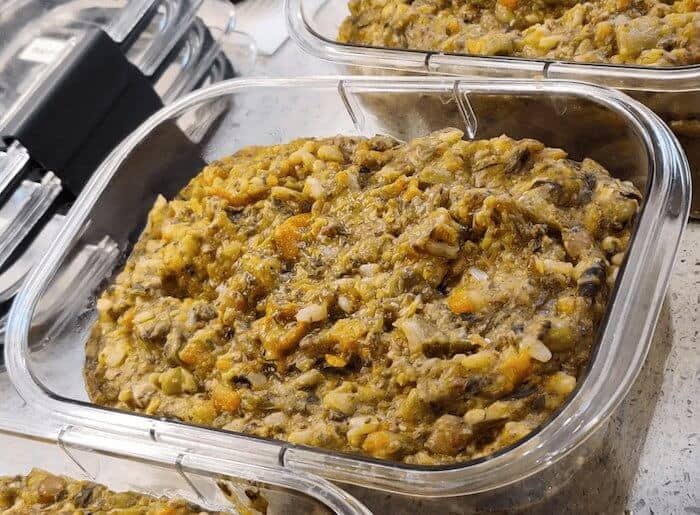
This recipe is rich in fiber, essential for a healthy digestive system. It’s made with ingredients like brown rice, lentils, garbanzo beans, various organic vegetables. Its soft and mushy consistency is especially appealing to dogs that prefer soft-textured foods.
4. Cassy’s Favorite
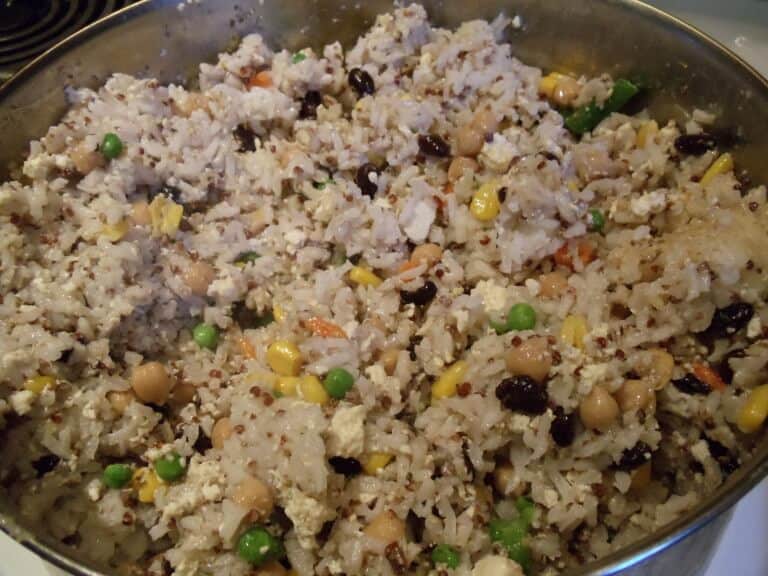
This recipe is great for dogs due to its nutritional richness and balance. Organic Indian basmati rice, tofu, black beans, garbanzo beans and red quinoa offer healthy carbohydrates and proteins. Mixed vegetables contribute essential vitamins and minerals, enhancing overall nutrition. Nutritional yeast provides B-vitamins, while ground flax seed is an excellent source of omega-3 fatty acids, beneficial for skin and coat health.
5. Vegan Dog Food Recipe + Vegan Kibble
The recipe combines a variety of healthy ingredients including basmati rice, quinoa, vegetables, and beans, enriched with nutritional yeast, flax seed, and oil. It’s designed to offer a balanced diet and add variety to a dog’s meals, making it particularly appealing for those looking to incorporate plant-based options.
6. Veggie Tumeric Mix
Chef Jana Pinheiro’s vegan dog food recipe is beneficial for dogs due to its blend of nutritious ingredients like cooked chickpeas, broccoli, spinach, brown rice, sweet potatoes, and turmeric. These ingredients offer a mix of protein, fiber, vitamins, and minerals essential for a dog’s health.
7. Homemade Dry Vegan Food
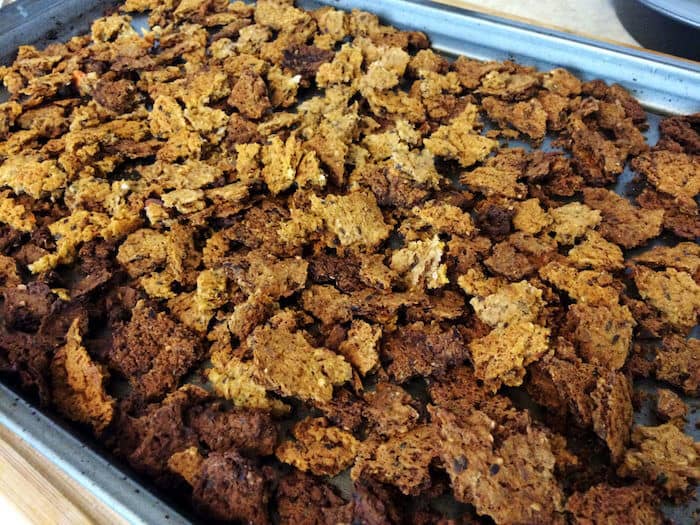
The recipe involves baking a puree of these ingredients to create a dry food, similar to commercial kibble, but with the benefits of homemade preparation. Dogs would likely enjoy this for its variety of flavors and the crunchiness of the dry food.
Vegetarian Dog Food Recipes
Looking for vegetarian dog food recipes? These homemade vegetarian dog food recipes vet approved can get you started. Remember, the key distinction between vegetarian and vegan diets for dogs is that vegetarian options may include animal-derived ingredients like cream cheese, but like vegan diets, they don’t contain meat.
8. Black Bean, Quinoa & Spinach Mix
This vegetarian homemade dog food recipe combines nutritious ingredients like cooked black beans, quinoa, spinach, butternut squash, apples, pears, zucchini, plain yogurt, and low-fat cream cheese. It’s super tasty and provides a balanced and enjoyable meal.
9. Banana, Quinoa & Veggie Mix
This recipes is simple, using ingredients like quinoa, sweet potato, frozen peas, and banana. This recipe is great for dogs due to its healthy and easy-to-digest ingredients, providing essential nutrients without meat. The combination of quinoa and sweet potato offers both protein and carbohydrates, while peas and banana add vitamins and fiber.
10. Homemade Vegetarian Dog Food With Eggs (Doggie Veggie Frittatas)
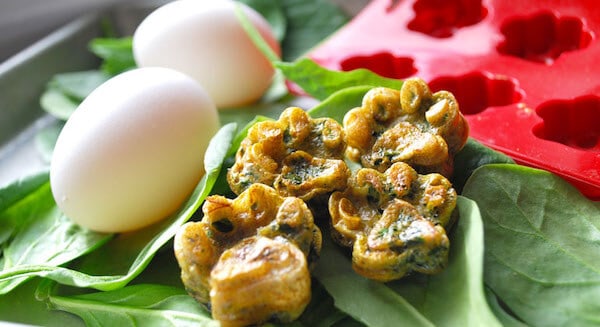
This vegetarian dog recipe is great for dogs as it’s a nutritious and enjoyable treat. Made with finely chopped veggies like spinach, kale, carrots, zucchini, and broccoli, it’s rich in vitamins and fiber. Eggs add protein, and the optional turmeric and black pepper offer anti-inflammatory benefits.
More Vegan Dog Food Recipes
To learn more about vegan dog nutrition or find more easy vegan dog food recipes, check out Plant-Based Recipes for Dogs: Nutritional Lifestyle Guide by Heather Coster. This vegan dog recipe book shows you exactly how to create nutritionally balanced vegan dog food recipes that are sure to win over even the fussiest eater.
Homemade Vegan Dog Food Recipe Delivery Service
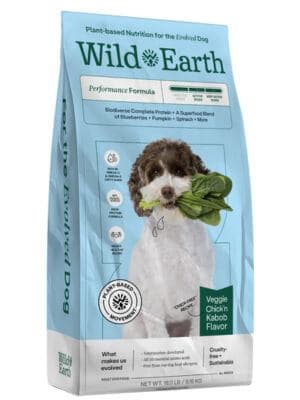
WILD EARTH
Who It’s For: The perfect homemade vegan dog food alternative if you don’t have time to cook for your dog or are unable to balance nutrients to provide a balanced diet.
Does vegan cooking food sound stressful? Don’t have the time? Feel lost when it comes to balancing plant-based ingredients? If you answered yes to any of these questions, you can still provide the benefits of a vegan diet to your dog without going through the hassle of cooking it. We’ve compiled a list of the best commercially available veg dog food recipes. These vet-approved vegan dog food recipes meet all the nutritional requirements dogs need to thrive.
Our top recommendation is Wild Earth – this vegan dog food company appeared on Shark Tank. Its veterinarian-approved recipe is made from plant-based and cruelty-free ingredients for healthier pets. They use only clean, sustainable and tasty plant proteins that offer more protein by weight than traditional dog foods. Its formula is boosted with superfoods including chickpeas, sweet potato, spinach, pumpkin and oats and more. 86% of their customers report that Wild Earth has improved their dog’s health. Want more options? Below you can check out our best vegan dry dog food recipes. Your pup is sure to love these vegan dog kibble recipes.
What Vegan Foods Should Your Dogs Never Eat?
Stone fruits such as cherries and peaches contain seeds that can cause cyanide poisoning. Similarly, grapes and raisins may cause kidney failure, and too many onions and garlic can cause hemolytic anemia, among other problems. Here is a non-exhaustive list of foods a dog shouldn’t eat to avoid these types of problems.
Check out this handy list for a comprehensive list of all foods to avoid. Please print it out and put it on your refrigerator as a reminder.
How to Transition Your Dog To A Vegan Diet
There are some dogs with sensitive GI tracts. To prevent stomach issues, you should transition to vegan dog food gradually. Here are the general guidelines you should follow when transitioning to a new diet.
Some dog owners opt to begin with 50% to simplify things but start with 25% (or a smaller percentage, like a Tablespoon) if your dog is hypersensitive. Consider extending the transition time to 5 weeks or longer if you feel it will be easier for your dog to adjust. Changing your dog’s food abruptly is not recommended. This may result in upset stomachs, diarrhea, or vomiting.
Vegan Nutritional Risks & Supplementation
It’s common for vegan diets to lack B vitamins, calcium, phosphorus and iron. A plant-based diet can also be deficient in fatty acids and amino acids, particularly taurine and L-carnitine. Consider adding the supplementation if your dog’s vegan meal plan (ingredients) does not provide the nutrients and vitamins mentioned above.
Monitor Weight And Health
A dog’s weight and gut health are essential indicators of their health, and you need to track them when switching to a new diet (i.e., homemade). Maintaining a healthy weight is easier when your dog is fed the right dog food. If your dog’s weight increases or decreases rapidly, it might be due to food-related health issues. A healthy gut can confirm a smooth transition to your dog’s new diet, among other health issues. However, identifying a healthy gut is not an easy task. Fortunately, an at-home dog gut health test can provide insight into your dog’s gut health.
Skin or coat issues, excessive tiredness, allergies, weight loss, malnutrition, and obesity can be caused by unbalanced and insufficient meal plans. If you detect any of these symptoms while feeding your dog meals, stop doing it immediately and seek expert advice.
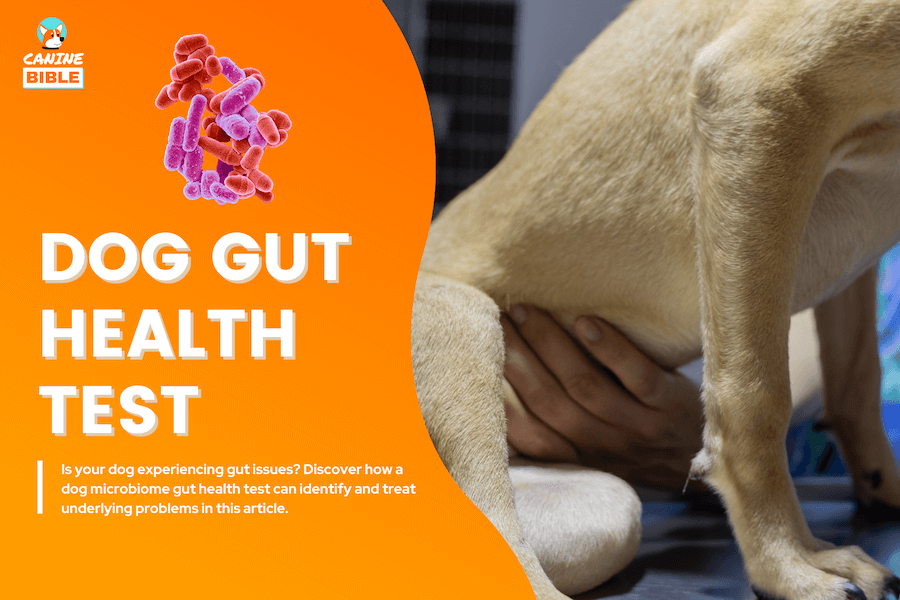
Vegan Dog Food Recipes — Conclusion & Alternatives
Homemade vegan dog food can be a healthy and affordable option for your pet. It is essential to consider your dog’s nutritional needs when preparing their food and consult with a veterinarian if you have any questions about whether a vegan diet is appropriate. By following these simple tips, you can ensure that your furry friend enjoys a delicious and nutritious meal that meets their dietary needs. The raw pet food trend is in vogue just as much as a plant-based diet for dogs. Learn all about it in our raw dog food guide.
Like It? Subscribe & Share!
Sources
Canine Bible uses only high-quality sources, including peer-reviewed studies, to support the facts within our articles. Read our editorial process and product review methodology to learn more about how we fact-check, test products, and keep our content accurate, reliable, and trustworthy.
[1] Lippert & Sapy [2] AVMA [3] Lyka, [4] Hardvard [5] NCBI, [6] PubMed, [6] UC Davis
Like It? Subscribe & Share!
Canine Bible authorship represents the unified voice of our entire editorial team and our in-house veterinarians rather than a single author. Each article, blog post, and review published under the Canine Bible name undergoes a rigorous review process, involving all team members to guarantee accuracy and up-to-date in accordance with the latest veterinarian research. This collaborative effort is an integral part of our editorial process and aligns with our four pillars of content creation. This approach ensures our content is backed by expert knowledge and factual information, offering our readers reliable, actionable, and trustworthy content.

